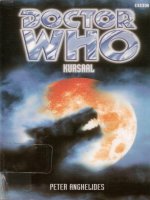Dr who BBC eighth doctor 08 option lock justin richards
Bạn đang xem bản rút gọn của tài liệu. Xem và tải ngay bản đầy đủ của tài liệu tại đây (1.14 MB, 254 trang )
Option Lock
By Justin Richards
For Alison, Julian, and the Other One - with love
Dark Ripples
The Khameirian cruiser was already beyond its tolerances when the
Yogloth Slayer brought it down. They had been playing cat and mouse
across half the galaxy, twisting, turning, running. And the cruiser was the
mouse. Rounding Rigellis III, it ran out of space, time, and luck.
The self-targeting torpedo must have torn through the drive section of the
cruiser like a wolf through a rabbit. Life support would have escaped the
worst of it, but the main computer and navigation systems were taken out
along with communications. Perhaps some of them died in the blast, it
hardly matters. The Stone knew them.
The systems limped on for a while, unwilling or unable to give up the fight.
Some residual energy in the drive systems, maybe. But the end was
inevitable. It is said that the Khameirian will to survive is unparalleled. But
they had to make planetfall to have any hope at all. And there are no
planets to be fallen to in the Rigellis systems. They burned across the
cosmos, leaving legends and prophecies in their wake. The Slayer
probably broke off after the initial hit. They're great ones for economy of
effort, the Yogloths. I have seen one of their assassins turn and leave the
seedy bar where he had cornered his target before the bolt was halfway
down the guidance beam. Lucky for me.
***
They had met before. Many times. Though tonight, their leader told them,
tonight would be different. But then he always told them that. And they
always believed him. But this time he was right. He may have visited each
in turn, the lamplight flickering across his face as their wives, their
daughters, their consciences, looked away sharply in embarrassment. Or
perhaps he told only the first of his followers, and the message was
whispered to the others in hushed, reverent, believing tones.
Imagine the cloaked figures making their way through the dying
thunderstorm. See them silhouetted against the full moon, glimpsed in the
moments when the dark clouds were driven from its glow by the same
winds as whipped their hoods around their faces. Dark figures approaching
the dark ruins atop the windswept hill. The fallen stonework as stark and
black in the night as their unspoken purpose. And all the while, one star in
the cloud-hidden heavens was flashing ever closer to their destiny.
Who knows what those men thought as they stood in the dark? See them,
cloaked and hooded like extras in a third-rate opera. Imagine with me that
you see them as they stand in their circle, toes to the chalk. See the
candlelight guttering on their faces and hear the wind howling through the
ruined stone. But they don't hear it, lost as they are in their stentorian
chant. Arms raised to heaven, voices raised to hell.
And for what? An impossible dream, a mystery, a myth. A hope almost
against hope that the new science and the old magic can combine, meld,
merge into something wonderful. But tonight the impossible fantasy of the
alchemists will become an impossible reality. The dream takes form,
becomes a nightmare. Here, in this ruined chapel on this windswept hill
beneath this stormy sky.
Imagine their leader standing beneath the ravaged roof of the chapel,
transfixed by a sudden shaft of moonlight. Then the light grows, as if in
answer to the chant. A vast fireball blurs across the horizon and screams
its way down towards them. They must have thought that all hell was
breaking loose at their command. I think they still believed that to the days
they died. And perhaps they were right. Who knows what power, what willpower, the Khameirian preservation systems responded to, what faint final
option they locked on to across the darkness of space? Six lonely men
brought together by their crazy aspirations and lazy philosophy. And after
that night, that visitation, living out their lives curled around the loneliness of
their nightmares, the blackness of the thoughts that were no longer their
own.
After the doom-crack of the cruiser furrowing its way across the field
outside and cratering the landscape, they stand still. Awed. Believing and
not believing that all is as they intended, expected, and hoped. Then the
ship wrenches its last few inches of life into the side of the shattered
chapel, sends masonry and stonework crashing through the heavy air.
They duck and scurry, searching out shelter in the darkness, thinking their
lives are in their own hands. The candles dip and waver before flaring in
the sudden stillness. And as dawn edges uneasily across the edge of their
world, the rotten wood of the door cracks open like an egg.
Imagine you see through their eyes, through their fear, as the creature
lurches into the gloom. It probably paused on the threshold, eyes glinting
as it struggled to make out the forms of things unknown. Then as their
imaginations bodied forth, it may have stumbled down the steps to the end
of its life. The stuttering light lost itself in the leathery folds of its wings, in
the darkness of its skin. But the face - the pinched, wrinkled features and
the short, curled horns - probably made the most impression on the already
impressionable men gathered that night.
It's incredible that it managed to get out of the ship, let alone seek out
salvation in the dark. But now at last it can give up the ghost, letting it slip
from the leathery claw that gripped so tight. It rolls across the cracked,
uneven stonework of the floor. The only sound is the rattle of it like a
marble as it leaves the creature's hand and curls its way to the leader of
the ceremony. A gift to him from the gods. Or devils.
He lifts it up, allows the first hints of light to merge with the reflected candle
flames on its surface. Perhaps he can already see the pale inner glow, but
if not he imagines it. And then he turns to his comrades and they make the
pact. Their first non-decision.
After that, they laugh nervously. They agree to meet again, to share their
thoughts and track their progress against an unspoken agenda. Every night
they watch the darkening skies, and every day their thoughts, their wills,
their selves ebb a little further from the shore. And all the time the light
inside the Philosopher's Stone glows slightly stronger as the point of focus
sharpens just a little more. Glowing towards fruition; towards life; towards
oblivion.
Chapter 1
Towards Oblivion
The air was heavy with latent thunder. A storm had been gathering for a
long while, yet it refused to break. The humidity was so intense you could
taste it, and the clouds hung heavy and low in the autumn sky. Captain
William Pickering looked out of the dusty window towards the remains of
the old manor house on the hill. If he glimpsed a flash among the ruins,
then perhaps it was lightning; if he heard a low rumble disturb the
afternoon, then it must be thunder. But through the bottle glass of the small
panes it was difficult to be sure of things.
***
Quite what it was, Henry Tanner could not tell. He heard the grating,
metallic crescendo of sound as he pushed his wheelbarrow along the
cinder path. He caught a glimpse of what might have been a flashlight
shone from behind the remains of a wall. He paused, waiting to see if the
light came again, pushing a tangle of stray grey hair up from his weathered
forehead.
But before it did, his mind cracked open and he sank to his knees in
sudden unexpected agony.
***
Tne pain seared through Colonel Roskov's brain like a branding iron. One
moment he was standing by the relief map on his office wall pointing out
the new defensive positions to Lieutenant Ivigan, the next he was on his
knees doubled up in agony. A tortured rip down the centre of Krejikistan
marked the path of his fall. Then suddenly the pain was gone. There was
just a realisation, an understanding in its place. Ivigan grabbed Roskov's
elbow, reacting too late to prevent his fall.
'Are you all right?'
Roskov looked up surprised. For a second there had been nothing in his
mind but purpose, mission. Destiny. No context.
Ivigan helped Roskov back to his feet. 'Are you all right, sir?' he said again.
***
Pete Kellerman picked himself up, clutching at the lectern for support. 'Yes.'
But he wasn't at all sure. 'Yes, I'm fine. Thank you.' He took a sip of water,
amazed at how steady his hand was, at how clear his thoughts were, at the
enormity of what he had to do. 'Let's call it a day, shall we?' he said to his
students, his voice husky with anticipation of the next phase. 'Tomorrow
we'll talk about the importance of deploying a coherent strategy across the
world.'
***
Right round the world, time slipped out of phase for a handful of people.
Their minds burned with sudden brilliant purpose, reeled under the
realisation of who and what they were. And at Abbots Siolfor, Norton Silver
stood beside William Pickering, looking out over his estate through
distorting glass. 'There's going to be a storm,' he said quietly.
***
The flames of the everlasting candles guttered and shook as if caught in a
storm. Shadows darkened and shifted, the spotlit swirl of the Prydonian
Seal seemed to fade in and out of existence as the light flickered.
Blackness stabbed through the chamber, darkening the cobwebbed
bookshelves and accumulated bric-a-brac. Inverse lightning in a space that
did not exist, a time that never happened. A concerto of chiaroscuro. The
howl of the impossible wind mixed with the slurring strains of Bach as an
antiquated vinyl record ground to a halt on its turntable. An old street lamp
regained its composure and luminance, lights glowed back into existence
on the various panels of the central control console. Above the console a
deceptively ancient television monitor went through a retuning cycle of
snowstorm patterns and static crackles before settling on a single line of
white text against a black background.
The wind dropped, the noise died, the light returned. Samantha Jones
pushed her blonde hair back out of her face. It was something of a novelty
to have hair long enough to get blown there in the first place. She was not
sure it was worth the hassle, but she was getting to like the way it framed
her face and hid her ears. The last few weeks had been relatively relaxed.
Since they had left Kursaal, the Doctor had taken them to a couple of
sunny paradise resorts, on a tour of the monuments of Marsuum, and
(accidentally, he claimed) mountain climbing in the Vasterial Wastes of
Julana. During this time, Sam had tried to grow her hair (successfully) and
quit biting her nails (less so).
And now this. She noted with amusement that the Doctor seemed to have
had no problem with his own long hair. He was slumped in an armchair,
feet up, reading. The drawing room incongruously joined the console area
of the TARDIS.
'So what gives?' she asked him.'Windswept in the TARDIS -not an
everyday fashion hazard, I would guess.'
'I guess not.' The Doctor tossed aside his copy of The Strange Case
ofDrJekyll and Mr Hyde and swung his feet off the footstool. His eyes were
intensely alive as he strode across to the console. 'Why does this always
happen when I'm reading?'
'I think the TARDIS gets bored when you're reading,' Sam told him. 'You
know, perhaps she likes to be a bit more involved in what's going on.
Maybe chat a little. Social pleasantries. Stuff.' She shrugged and wandered
over to join him by the screen.
CRITICAL ARTRON ENERGY DRAIN
The words flashed across the monitor. 'What does that mean?'
The Doctor took a deep breath.'Who knows?' Then as they watched the
message changed:
COMPENSATING FOR POWER LOSS
'Well, there you are.' The Doctor smiled brightly and made his way back to
his armchair. 'Nothing at all to worry about.' He scooped up his book and
was immediately engrossed.
Sam was not so sure. There was a sudden calm after the storm that she
found unsettling. She looked round, and it occurred to her why it seemed
so still. 'The rotor's stopped,' she said. 'We've landed.'
The Doctor turned a page. 'The power drain pulled us out of the vortex,' he
said without looking up.'Or it's something local that happened as we
materialised. Doesn't matter. The power's building nicely again now as the
Eye of Harmony absorbs background energy from the world outside.' The
book lowered slightly and the Doctor's eyebrows became visible above
it.'We'll be stuck here for a bit till everything's charged up again, but that's
hardly an inconvenience.' Another page turned. 'We've plenty to read.'
Sam watched him for a few moments. He seemed prepared to sit for
eternity with his nose in a book. She grimaced, hands on hips.'So where
are we, then?'
'Earth.'
'Earth?'
The Doctor lowered his book with the slow movement of forced patience.
'Earth. 1998. Or thereabouts.' He raised the book again.
'So why don't we go outside and see what's going on?'
No answer. Sam went over to the Doctor and knelt in front of his armchair.
She reached out and pulled the book down from his face. His eyes were
already focused on her own as she said again.'So why don't we go outside
and see what's going on?'
For a split second his eyes were hard, his face set. Then he grinned
suddenly and broadly. 'Why not?' he said. 'I think it's going to be a lovely
day.'
***
It was a lovely day. A few clouds wandered lazily cross a deep-blue sky
and the trees shimmered in the autumn heat and the light breeze. Henry
Tanner stared up, aware of the slight damp of the grass beneath his head.
Calm. Peaceful. At ease.
So what was he doing lying on the ground?
Tanner struggled to his feet, his elderly joints protesting and his knees
cracking as he put weight on them. He blinked several times. A blackout of
some sort? He had never had one before. He looked round, hoping for
some clue in the landscape - a rock he might have tripped on, a slippery
patch of mud. There was neither. Just a toppled wheelbarrow beside the
track, the stark ruins of the old manor house on the brow of the hill, and two
people hurrying down the slope towards him. As he watched, they passed
the fallen remains of a statue, the taller figure pausing for a moment to
inspect the grotesque features. Then he was off again, hurrying down the
slope after his companion.
Two people. He frowned. Tanner knew he was the only person working in
the garden today. It was a Saturday, and the rest of the staff took the
weekend off. But the grounds were Tanner's life. He accepted only
grudgingly that he needed any help at all, and the weekends were precious
short days of peace. Time to plan and to refine. Time to take stock, to
enjoy.
'Are you all right?'
The two figures had almost reached Tanner now. The young woman with
blonde hair was slightly out of breath, but the older man was not even
breathing heavily. He looked to be in his thirties, though his eyes seemed
somehow older, deeper. Despite the warmth of the autumn afternoon, the
man was wearing a long, heavy coat over a formal shirt and paisley
waistcoat. A grey-green cravat added to the formality. Yet the off-centre
tiepin, the ragged velvet cuffs of the dark coat, and the wildness of his long
hair suggested a lack of interest in his appearance.
'You looked as if you'd fallen,' the man said. His voice was soft but had a
powerful edge to it. An indeterminable trace of accent. Northern perhaps.
Not local, anyhow. He reached out and dusted a blade of grass from
Tanner's shoulder. 'Are you all right?' he repeated.
Tanner nodded.'I'm fine,' he said, rolling his shoulder where the stranger
had touched it.
The man smiled.'Good.'
Tanner glared at them, trying to hide his embarrassment, and made
towards the wheelbarrow.
The girl got there first. 'Let me,' she said, as she uprighted the barrow. Her
voice was friendly, with a hint of the town in it.
'I can manage.' Tanner pushed the wheelbarrow slightly off the track, and
turned back to the strangers.'Now who are you? What are you doing here?'
The man considered, hands clasped in front of him. 'Well...'
'This is private property, you know,' Tanner prompted.
'We know,' the girl said. 'Don't we?' Her companion did not answer.'Don't
we?'
'Yes, yes, yes. Of course we do. Absolutely.' He looked round. 'Private
property. Indeed. And very nicely kept too.' He leaned forward with a
grin.'You do it all yourself?'
Tanner found himself answering without even thinking. 'The important
things, most of them anyway. Of course I need more help these days than
when I was younger. I used to help my dad when he was head
groundsman, and just the two of us could cope for the most part. But with
the new machinery to help. And Mr Silver is more particular about
appearances than his father was. Quite rightly so, too, in my opinion. Not
that we were ever lax, you understand. Never.'
The man nodded in complete understanding and agreement.'And the ruins
would be, what, fourteenth century perhaps? Thirteenth at a pinch?'
Tanner frowned. Suddenly he seemed to have accepted these two
strangers, although he wasn't sure how or why. 'That what you're here for,
is it? The ruins?'
'Might be,' the girl said.
Tanner nodded thoughtfully. That would explain things. 'You'd best see Mr
Silver if you're wanting to research them,' he said. 'Mr Silver does a lot of
researching of these things himself. Very interesting it is to him.'
'I'm sure.'
'Experts, are you? Historians?'
The man grabbed Tanner's hand and shook it with ruthless enthusiasm.
'I'm the Doctor,' he said as if this explained everything. 'And this is my
research assistant, Miss Jones.'
'Sam,' the girl added, taking her turn shaking Tanner's hand.
Tanner fumbled in his pocket and pulled out his mobile phone. He stared at
it for a moment. He rarely used it, and nearly always to answer calls from
his gardeners, usually asking dumb-fool questions they should know the
answers to.
The Doctor gently took it from him, turned it over, and flipped open the
cover. Then he handed it back.
'Mr Silver expecting you, is he?'
'He will be.'
The girl - Sam - smiled, tossing her head so that her hair swung away from
her face. 'We're here to make an appointment, actually.'
Behind them the ruins of the old manor house stood, dark and impassive,
against the deep sky.
***
Norton Silver stood straight and still on the driveway as he waited for them
to join him. As they approached, Sam could see that he was a big man,
broad and tall. He looked as though he was in his fifties, with steel-grey hair
and the first few lines of age on his tanned face. He wore a suit that was
slightly darker than his hair, and he looked like a businessman. Behind him
was the modern house, as Tanner had described it, although even to
Sam's untrained eye it looked ancient.
'The ruins are definitely thirteenth century in origin,' the Doctor said quietly
as they crunched up the driveway. 'This house appears to be part sixteenth
century and part later, right up to that Victorian wing.' He leaned round Sam
to point, his other hand on her shoulder, warm and reassuring.
As they came within earshot, Silver called out to them. His voice was
powerful and deep. A voice used to speaking with authority. Used to getting
its own way. 'My ancestors had trespassers shot.'
The Doctor and Sam exchanged worried glances.
But then Silver smiled, and strode towards them. 'Thankfully we live in
more enlightened times. You must be Miss Jones,' he said to Sam. Then
he turned to the Doctor. 'I'm afraid Tanner was rather vague about your
name, as he was about your business here.'
'Oh let's not be formal.' The Doctor was grinning, his head bobbing from
side to side in jovial amusement. 'This is Sam, and I'm the Doctor.' He took
Silver by the arm, swung him round and led him back towards his house.
'We're absolutely fascinated by the history of this place. Old house, big
terraced gardens. Ruins. Fascinating.' He stopped suddenly so that Silver
was forced to turn round again. 'You weren't expecting us?'
Silver frowned.'Perhaps,' he said slowly.
'We wrote. Well, I think we wrote. You wrote, didn't you, Sam?'
'Yes,' Sam answered, just too quickly. 'Definitely,' she added with a halfsmile.
The Doctor smiled. 'There. You see.'
Silver laughed.'Oh, that doesn't mean anything. Post's awful round here.
Probably arrive next week. E-mail, that's the thing. When it works, of
course.' He called back to Tanner, who was lagging behind like a forgotten
puppy. 'Thank you, Tanner.'
Tanner nodded to Silver, acknowledging his dismissal.
Silver watched Tanner turn and start back towards the hill. 'He's nearer
God's heart in a garden than anywhere else on earth.'
'Kipling,' Sam said knowingly. Silver raised an eyebrow, but said nothing.
'You're too kind,' the Doctor told him, and turned to Sam.'It's Mrs Dorothy
Frances Gurney.'
'You know everything,' Sam said.
'Eighteen fifty-eight to nineteen thirty-two. She had the most wonderful
begonias, you know.'
Silver shook his head and continued along the drive. Actually, I think she's
right, Doctor.'
'That it's Kipling?
'That you know everything.'
The main entrance to the house was through a large panelled and
studded oak door set within a tall archway. Above it a rectangular window
was split by stone mullions into tall narrow panes. Above that, the
stonework was crenellated into battlements.
'Welcome to Abbots Siolfor.'
'Very impressive,' the Doctor admitted. 'Early sixteenth century, for the
most part, I think. Though the battlements look more recent.'
'Definitely,' Sam agreed.
Silver opened the door and waved them through. 'You're right, of course.
The window was added later, in about 1620. The battlements are early
Victorian.'
'There is one thing I don't know,' the Doctor admitted, pausing on the
threshold. He pointed up at a carving in the arch above the doorway. It was
a figure, short and squat. Despite the weathering, Sam could see that
webbed wings sprouted from its shoulders, and short horns from its
forehead. It's hand - more like a curled claw - was held out, as if in offering.
The face was a grotesque gargoyle. 'These carvings are all over the old
ruins too. I even noticed a fallen statue that might once have been in the
same form.'
'It's a recurring motif,' Silver agreed. 'It seems to have been widely used in
the original manor house, then picked up and copied here. Nobody is quite
sure of its significance.' He leaned closer to the Doctor suddenly, as if
struck by a thought. 'Unless you can enlighten us.'
The Doctor considered.'We'll have a go,' he said.
Silver blinked, then laughed.'Good,' he said.'Jolly good. Now, come and
meet my wife.'
***
Penelope Silver was tall and slim. Whereas Silver was dressed in a grey
suit as if he were about to attend a board meeting, Penelope was dressed
as if she had just ducked out of a cocktail party. Her long auburn hair was
tied up and pulled away from her face, emphasising her classical, almost
aquiline features. Apart from her obvious beauty, two things were
immediately apparent to Sam as Penelope leaned forward and let her
husband kiss her cheek: she was about twenty years younger than him,
and she adored him.
Silver seemed to be completely at ease now with the idea that the Doctor
and Sam were historians who had arrived to delve into the mysteries of the
ruined manor house. He introduced them to his wife as if they were old
friends and colleagues. 'Let's have some tea, then I'll get Sargent to show
you the library,' he said, rubbing his hands together with enthusiasm. 'He's
a real boffin when it comes to local history. Knows even more than I do. I
think you'll be impressed with my library too - lots of source materials
relating to the original house as well as to this one.'
Penelope gestured for Sam to sit next to her on the sofa. 'Once Norton and
Sargent get going,' she said quietly, 'there's no stopping them. They're like
a couple of kids with new toys.' She reached behind and pulled a thin
braided rope on the wall. Far away somewhere a bell rang.
Sam smiled. 'I think there may be three kids now. The Doctor's probably
twice as bad.'
Tea was brought by Miss Airworthy, a greying lady of uncertain age and
considerable bulk who acted as housekeeper for the Silvers. She exuded
an air of quiet efficiency and experience, and was dressed in a white
blouse and a dark skirt like a waitress in a tea shop.
Miss Allworthy poured, and Penelope Silver took the first cup and handed it
to the Doctor.'Where are you staying?' she asked him.'I presume this
research of yours will take a while.'
'Yes. Several days.' The Doctor made to take the tea, but Penelope held on
to the saucer, determined to get an answer. 'We're staying, er, locally,' the
Doctor eventually admitted.
She was scandalised. 'Oh, not at that awful place in the village?' She shook
her head in sympathy. 'I suppose Mrs Thompson means well and I gather
she's a competent cook, but...' She shook her head again, looking first to
Miss Allworthy, who remained impassive, then to her husband. He
shrugged, and she took this as agreement.'You must stay here, with us.
We've plenty of room. I won't take no for an answer.'
'Thank you,' the Doctor said at once. He raised his cup in salute.'We'll
collect our things after tea.'
'But won't we get in the way?' Sam asked. 'And think of the extra work.'
Extra work? Of course not. And I shall be glad of the company - Norton's so
tied up with his research. I'm sure Miss Allworthy can cope.' She glanced
across for acknowledgement, and seemed to get no response. After a
moment, Miss Allworthy left the room.
'She's thrilled really,' Penelope stage-whispered when Miss Allworthy had
gone. 'I think she gets bored without a little variation now and again.'
'We've got Pickering staying anyway,' Silver added. 'Another couple of
bodies won't make much odds.'
'Pickering?' the Doctor asked, in a voice that suggested he enjoyed a good
picker when he got the chance.
'That's me,' said a voice from the door. Standing on the threshold was a tall
slim man with short dark hair. He was standing straight and still, hands
behind his back, almost to attention. Sam wondered how long he had been
there. 'Miss Allworthy hinted there might be some tea if I hurried.' He
walked purposely across to help himself to a cup. 'And who are you, then?'
he asked.
Again Silver made the introductions, showering accolades on the Doctor
and describing him as a noted and widely published academic. Sam was
curious to know what the Doctor had told him while she had been speaking
to Penelope. When he had finished singing the Doctor's praises, Silver
stood by the window looking out over the grounds. The shadows were
beginning to lengthen as the day drew in.
'And you're Pickering?' the Doctor asked.
Pickering poured himself a cup of tea and sat down.'William Pickering.'
'Military or police?' When he looked startled the Doctor explained,'Your
bearing suggests one or the other. If not both.'
'I'm a captain in the army'
'And you're here on business?' Sam asked.
Pickering hesitated, and Silver answered for him.'I do some consulting for
the Ministry of Defence, amongst other organisations. Training, personal
skills, that sort of thing. Captain Pickering is here to take advantage of
some one-to-one education in lateral-thinking techniques and forms of
strategy development.'
The Doctor leaned forward, enthralled. 'Really? How fascinating. Perhaps I
could join in, offer some advice?'
'I don't think so, thank you, Doctor.' There was an edge to Pickering's voice.
Then he seemed to realise he was being too serious, and he added with a
smile,'Not unless you've signed the Official Secrets Act.'
The Doctor smiled too.'Several times, though usually against my better
judgement. It's always amazed me that you can make something officially
secret. That rather suggests you have to tell a lot of people, who then
decide that it's official that you can't tell them. But I'm happy to leave you
and Mr Silver to your lateral-thinking techniques and strategy development.'
'That's probably very wise, Doctor,' Silver told him, turning from his
inspection of the gardens.'After all, history is so much more interesting,
don't you think?'
***
A shadow fell across Alan Ferrer's face as the car turned on to Rogers
Street. The sun had been bright, even through the tinted, bulletproof glass,
so Ferrer was glad of the shade provided by the Cambridge Side Galleria
across the street. They were almost there now, a couple of blocks at most.
Then another round of meetings with a large software company about the
tough, and probably irrelevant, export controls on strong encryption
technology.
Boston and the surrounding area was home to several of the major players
in encryption and secure communications. President Dering had sent
Ferrer, as his National Security Adviser, to find out more about the subject
before deciding how to tackle the increasing pressure to change the law
that classified encryption software as munitions. Ferrer had started with the
main players. He had been out at Bedford with representatives from RCA
and its parent company, SDI, that morning. Next on the agenda was the
Lotus Corporation, the application-software arm of IBM.
Ferrer yawned, knowing that all his meetings would be similar in tone to the
one that morning. Experts and businessmen would tell him that the law was
crazy, and lawyers would tell him it was impossible to enforce or to police.
As if he didn't know. Code that you couldn't legally compile and export on a
diskette you could print out and publish in the New York Times or any other
journal protected by the First Amendment. Crazy. What nobody would tell
him was how the President could gracefully climb down and explain his
change in policy to Congress without looking like a dork.
A large red-brick building was coming up on the left, opposite a similar
complex on the other side of the road. The large black Lincoln started to
slow. The engine was powerful enough for it to travel at great speed, but
the weight of the armour-plated sides meant that it took a while to stop. In
theory that momentum could be a life-saver. In practice it meant than under
normal circumstances the car kept its speed low and the driver kept one
foot on the brake.
Beside Ferrer, a Secret Service agent pulled mirrored sunglasses from the
top pocket of his unbuttoned jacket and slipped them on. Shades on, he
turned his attention to the few people on the street, the windows
overlooking it, any hint or sign of possible trouble. In the front passenger
seat, another agent went through a similar procedure.
'Ready, sir?'
Ferrer nodded. 'Yes, thank you.'
***
His finger tightened on the trigger as he applied first pressure. The open
window was angled so that the sun reflected off it, hiding the muzzle of the
rifle. He was on the third floor of the Royal Sonesta hotel adjoining the
office block, and had an excellent view of the car as it drew up outside. He
sighted on the rear, nearside door.
***
The door opened and a Secret Service agent got out. He looked round
once, slowly, then opened the rear door with his left hand. His right hand
stayed in front of his body, never far from the shoulder holster concealed
beneath his jacket. He stepped back, looking round yet again, as his
colleague got out of the back seat, his head emerging first from the car.
***
The figure was wearing a dark suit, and the back of his head was framed in
the sniper sight. The cross-hairs centred on the area where the short dark
hair was thinning slightly round the crown. He exhaled, and squeezed the
trigger.
***
The bullet hit the agent in the top of the head, tore through his brain and
exploded out beneath his chin. His colleague, still holding the car-door
handle, reacted immediately. Spattered with blood, he whirled round,
handgun already drawn. Crouched in the shadow of the Lincoln, he swept
the windows above with his eyes, gun held two-handed as he scanned.
Nothing.
Still holding the gun pointing up at the hotel windows with his right hand,
the agent dragged the lifeless body from the back of the car.
'You - drive,' he shouted through the door at the driver.'And you - lie down,'
to Ferrer. Then he slammed the door shut and dived for the cover of the
low wall in front of the hotel. The Lincoln was already pulling away before
the door had closed, the engine roaring and the tyres screeching along the
kerb.
On the sidewalk, the dead man's jacket flapped open. His white shirt was
soaked in his blood, and his shoulder holster was clearly visible.
***
The assassin swore, dropped the rifle, and stood up. On a tripod beside
him a Russian Ruchnoy Protivotankovy Granatomet - an RPG - stood
prepared. He swung it round to follow the Lincoln.
***
The car was picking up speed. Ferrer crouched down on the back seat,
despite the bulletproof glass
The surviving agent peered over the wall and up at the hotel cautiously. He
was looking for the tell-tale sight of a rifle barrel or a muzzle flash from the
hotel.
What he actually saw was the whole of one of the third-floor windows
explode outward in a shower of glass. Instinctively he knew what that
meant, and ducked. He screamed a hopeless warning at the car, but it was
lost in the deafening roar of the explosion.
The shell ripped into the road ahead of the vehicle, showering it in chunks
of pavement and concrete and tearing a wide hole in Rogers Street. The
driver wrenched at the steering wheel as he slammed his foot down on the
brake. The Lincoln swerved, teetered on the edge of the hole, and
shuddered to a halt. The wheels spun noisily as the driver slammed the car
into reverse. After what seemed like an eternity, they gained a purchase on
the fractured surface and the car started backwards with a lurch. As it
gathered speed, the limo weaved from side to side, catching the kerb and
juddering back into the centre of the carriageway.
Behind the wall, the agent was shouting into his radio. In the limo, the
driver was struggling to control the rapidly reversing weight of the car.
Ferrer was curled up on the back seat thinking of his wife and daughters.
Then the second shell struck.
***
The second shell, like the first, was a shaped charge. It impacted on the
side of the Lincoln, and exploded. The charge was packed into a hollow
cone lined with metal. Because of the cone, the explosion actually took
place a few inches from the side of the vehicle. The heat of the detonation
melted the metal in the cone, and the force of the charge produced a jet of
white-hot gas. In a fraction of a second, the gas jet forced the molten mass
of metal through the armour plating of the limo and the bulk of the
explosion expended itself inside the car. The strength of the impact
knocked the heavy vehicle across the road and turned it on to its side.
The occupants were already dead by the time, a split second later, that the
force of the blast ruptured the gas tank. With a thunderous roar the
limousine exploded in a black and orange ball of smoke and flame. Debris
rained down on Rogers Street.
The Secret Service agent felt drops of molten metal sting his face, smelled
them burn tiny holes in his jacket as he raced for the main entrance to the
hotel. But he knew he was too late.
***
The assassin threw himself through the door at the bottom of the stairwell,
and charged across the foyer. He heard a shout from behind, and ignored
it. He was nearly there now. Through the back doors of the hotel, and
across the narrow street outside.
He heard the doors slam open again behind him, another shout, the report
of a gunshot and a bullet whistled past him.
Just beyond the street was the Charles river. And tied up at its edge was a
motor launch. He leapt the short distance to the boat, and threw off the
rope. The engine was already idling and he pushed the throttle forward,
feeling the surge of power as the craft leapt forward in the water. Only then
did he look back.
On the bank, he could see the Secret Service man standing legs apart, gun
held two-handed as he aimed. The figure was receding rapidly as the
man's hands jumped slightly. Then the assassin felt a sudden flash of pain
in his left thigh, and heard the sound of the shot.
The launch passed under Longfellow bridge and out of sight of the hotel.
He could see the rising cloud of oily black smoke in the distance, and feel
the blood trickling down his left leg to form a sticky pool on the wet floor. He
gritted his teeth and steered the boat towards the nearest bank. He still had
much to do.
***
The Doctor seemed to be wallowing in the local history, the books and
documents in Silver's library, and the learned company. Sam found the
history boring, and tended to spend most of the day with Penelope Silver.
Penelope's husband and Captain Pickering spent most of their time locked
away in
Silver's offices in the basement and cellars of the house. And this was a
shame, Sam reflected, since Silver seemed quite charming and Pickering
was witty, handsome, and always had time to talk to her.
In fact, they spent a lot of time together. The first morning of their visit, Sam
had set off almost before dawn to jog a couple of miles round the grounds.
She started along a gravelled path that led from the terrace through the
rose gardens and out towards a small wooded area. The route she took
was a little hilly at times, but pleasant and attractive. From the hill behind
the house she had a good view of almost the whole estate. She paused,
not so much to catch her breath as to admire the view.
'Come on, slacker. No time to dawdle.'
Sam whirled round, startled by the shout. Pickering ran past her, in the
opposite direction to the way she had been going. He turned, jogging easily
backwards and waving cheerily to her as he went. She watched him until
he turned round again and ran off into the distance.
The second morning, Pickering was waiting for her on the forecourt outside
the front door. He was stretching and limbering up, but she knew he was
waiting. She set off at a brisk pace without acknowledging his presence. A
few moments later he caught her up.
'Good morning.'
'Hi there.'
They jogged a short way in silence. Then he said,'I knew you weren't
slacking, actually. That view is fantastic, isn't it? There's some great
scenery round here. Makes a change from pounding the pavements.'
'How far do you go?' she asked him, without thinking.
He answered at once, and without undue humour. 'A couple of miles. Three
maybe. Depends how I feel.You?'
'About the same.'
'Every day?'
'When I'm not saving the world.'
He laughed, obviously taking it as a joke. But his answer was in a more
serious tone. 'I know the feeling.' After another hundred yards he said,'Let
me show you a good route. Very pretty. Not too steep.'
'OK.'
'Do you know the grounds very well?'
'Assume I'm ignorant,' she said. The effort of running was just beginning to
tell, and her voice was low and lacking in tone as a result.
He took it for a lack of enthusiasm. 'Do you mean ignorant, or indifferent?'
Sam caught her breath. 'I don't know,' she said, 'and I don't care.' And they
both laughed. A happy, joyful sound in the dew-drenched still of the early
morning.
The morning run became a habit after that. Sam found herself looking
forward to the refreshing ritual, enjoying the quiet company of Captain
William Pickering. She thought he appreciated it as well.
***
The Doctor spent most of his time lecturing Paul Sargent in the library.
Sargent was Silver's part-time archivist and lived in the nearby village of
Abbots Clinton.
Sargent was, Sam thought, young for a historian. She had expected
somehow that history was the province of the old, being so old itself.Yet
Sargent was probably in his early forties. His blond hair was thinning from
the front, and there was a touch of grey around the temples, but he seemed
otherwise to be in good physical shape. His main problem, Sam thought,
was that he seemed to have no topics of conversation other than books,
documents, and history, and no discernible sense of humour whatsoever.
The library reminded Sam of the TARDIS, only rather better organised. She
actually quite liked it, though the research the Doctor seemed to be doing initially as a part of his 'cover' for Silver, but now out of passionate curiosity
- held little interest for her. She'd had enough of local-history projects and
dusty books at school.
That said, there were three things in the library in which she and the Doctor
shared a fascination. The first was the recurring gargoyle motif. The
bookcases, all custom-built for the oak-panelled room, had the gargoyle's
grotesque face carved into their upper frames. The stone fireplace had
gargoyle figures either side of the mantelpiece. Even the upper centre
panel of the heavy wooden door was adorned with the bizarre image. Sam
shuddered whenever she saw it, yet like the Doctor she was intrigued to
know its meaning.
The second fascination was a series of nineteenth-century paintings. In
fact, they were not limited to the library. Throughout the house were hung
identically mounted and framed oil paintings by the same artist in the same
style. They all depicted aspects of the house and the surrounding grounds.
There were even several of the ruins of the original manor house where the
TARDIS had materialised, and these showed how little the ruins had
altered over the last century. They were startling in their attention to detail,
the perspective was exact. They gave a real feeling for the timeless nature
of the gardens and the architecture. Among them, in appropriately lighter
frames, were some of the pencil sketches and working drawings from
which the paintings themselves had been executed.
Sam was not quite sure what her fascination with the pictures was. She
had been staring again at one of them in the library when the Doctor had
joined her. Together they looked at the painting, and admired the
brushwork and the detail. It was a view over the ruins, from the top of the
hill almost where the TARDIS had landed. In the middle-ground, on the
brow of the next hill, was a small copse of trees. It was called Lord
Meacher's Clump according to Sargent, who saw nothing funny in the
name. Two trees at the front were slightly forward of the rest and a little
taller, the others evenly spread behind them.
'You sense it too, don't you?' the Doctor said quietly to Sam, . obviously not
wanting Sargent to hear across the room.
'Sense what?'
'You know,' he said. Then he seemed to realise that she did not. 'There's
something unsettling about these pictures. Something not quite right.' The
Doctor shook his head and drew in a frustrated breath.'Don't you feel it?'
Sam turned back to the picture. He was right, of course. She hadn't
consciously realised, but there was something unsettling - disturbing even about the painting. Something, as the Doctor had said, not quite right.
After that she spent an afternoon examining all the paintings she could find,
as well as the working drawings. Some of them left her with no feeling of









